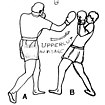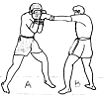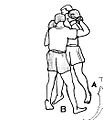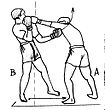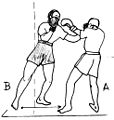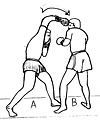Equipment
Since boxing involves forceful, repetitive punching, precautions must
be taken to prevent damage to bones in the hand. Most trainers do not
allow boxers to train and spar without wrist wraps and boxing gloves.
Hand wraps are used to secure the bones in the hand, and the gloves are
used to protect the hands from blunt injury, allowing boxers to throw
punches with more force than if they did not utilize them. Gloves have
been required in competition since the late nineteenth century, though
modern boxing gloves are much heavier than those worn by early
twentieth-century fighters. Prior to a bout, both boxers agree upon the
weight of gloves to be used in the bout, with the understanding that
lighter gloves allow heavy punchers to inflict more damage. The brand of
gloves can also affect the impact of punches, so this too is usually
stipulated before a bout. Both sides are allowed to inspect the wraps
and gloves of the opponent to help ensure both are within agreed upon
specifications and no tampering has taken place.
A mouth guard is important to protect the teeth and gums from injury,
and to cushion the jaw, resulting in a decreased chance of knockout.
Both fighters must wear soft soled shoes to reduce the damage from
accidental (or intentional) stepping on feet. While older boxing boots
more commonly resembled those of a professional wrestler, modern boxing
shoes and boots tend to be quite similar to their amateur wrestling
counterparts.
Boxers practice their skills on two basic types of punching bags. A
small, tear-drop-shaped "speed bag" is used to hone reflexes and
repetitive punching skills, while a large cylindrical "heavy bag" filled
with sand, a synthetic substitute, or water is used to practice power
punching and body blows.
In addition to these distinctive pieces of
equipment, boxers also utilize sport-nonspecific training equipment to
build strength, speed, agility, and stamina. Common training equipment
includes free weights, rowing machines, jump rope, and medicine balls.
Boxing matches typically take place in a boxing ring,
a raised platform surrounded by ropes attached to posts rising in each
corner. The term "ring" has come to be used as a metaphor for many
aspects of prize fighting in general.
Technique
Stance
The modern boxing stance differs substantially from the typical
boxing stances of the 19th and early 20th centuries. The modern stance
has a more upright vertical-armed guard, as opposed to the more
horizontal, knuckles-facing-forward guard adopted by early 20th century
hook users such as Jack Johnson.
In a fully upright stance, the boxer stands with the legs
shoulder-width apart and the rear foot a half-step in front of the lead
man. Right-handed or orthodox boxers lead with the left foot and fist
(for most penetration power). Both feet are parallel, and the right heel
is off the ground. The lead (left) fist is held vertically about six
inches in front of the face at eye level. The rear (right) fist is held
beside the chin and the elbow tucked against the ribcage to protect the
body. The chin is tucked into the chest to avoid punches to the jaw
which commonly cause knock-outs and is often kept slightly offcenter.
Wrists are slightly bent to avoid damage when punching and the elbows
are kept tucked in to protect the ribcage. Some boxers fight from a
crouch, leaning forward and keeping their feet closer together. The
stance described is considered the "textbook" stance and fighters are
encouraged to change it around once it's been mastered as a base. Case
in point, many fast fighters have their hands down and have almost
exaggerated footwork, while brawlers or bully fighters tend to slowly
stalk their opponents.
Left-handed or southpaw fighters use a mirror image of the orthodox
stance, which can create problems for orthodox fighters unaccustomed to
receiving jabs, hooks, or crosses from the opposite side. The southpaw stance, conversely, is vulnerable to a straight right hand.
North American fighters tend to favor a more balanced stance, facing
the opponent almost squarely, while many European fighters stand with
their torso turned more to the side. The positioning of the hands may
also vary, as some fighters prefer to have both hands raised in front of
the face, risking exposure to body shots.
Modern boxers can sometimes be seen tapping their cheeks or foreheads
with their fists in order to remind themselves to keep their hands up
(which becomes difficult during long bouts). Boxers are taught to push
off with their feet in order to move effectively. Forward motion
involves lifting the lead leg and pushing with the rear leg. Rearward
motion involves lifting the rear leg and pushing with the lead leg.
During lateral motion the leg in the direction of the movement moves
first while the opposite leg provides the force needed to move the body.
Punches
There are four basic punches in boxing: the jab, cross, hook and
uppercut. Any punch other than a jab is considered a power punch. If a
boxer is right-handed (orthodox), his left hand is the lead hand and his
right hand is the rear hand. For a left-handed boxer or southpaw, the
hand positions are reversed. For clarity, the following discussion will
assume a right-handed boxer.
-
-
Cross - in counter-punch with a looping
-
-
- Jab
– A quick, straight punch thrown with the lead hand from the guard
position. The jab is accompanied by a small, clockwise rotation of the
torso and hips, while the fist rotates 90 degrees, becoming horizontal
upon impact. As the punch reaches full extension, the lead shoulder can
be brought up to guard the chin. The rear hand remains next to the face
to guard the jaw. After making contact with the target, the lead hand is
retracted quickly to resume a guard position in front of the face.
- The jab is recognized as the most important punch in a boxer's
arsenal because it provides a fair amount of its own cover and it leaves
the least amount of space for a counter punch from the opponent. It has
the longest reach of any punch and does not require commitment or large
weight transfers. Due to its relatively weak power, the jab is often
used as a tool to gauge distances, probe an opponent's defenses, harass
an opponent, and set up heavier, more powerful punches. A half-step may
be added, moving the entire body into the punch, for additional power.
Some notable boxers who have been able to develop relative power in
their jabs and use it to punish or 'wear down' their opponents to some
effect include Larry Holmes and Wladimir Klitschko.
- Cross
– A powerful, straight punch thrown with the rear hand. From the guard
position, the rear hand is thrown from the chin, crossing the body and
traveling towards the target in a straight line. The rear shoulder is
thrust forward and finishes just touching the outside of the chin. At
the same time, the lead hand is retracted and tucked against the face to
protect the inside of the chin. For additional power, the torso and
hips are rotated counter-clockwise as the cross is thrown. A measure of
an ideally extended cross is that the shoulder of the striking arm, the
knee of the front leg and the ball of the front foot are on the same
vertical plane.
- Weight is also transferred from the rear foot to the lead foot,
resulting in the rear heel turning outwards as it acts as a fulcrum for
the transfer of weight. Body rotation and the sudden weight transfer is
what gives the cross its power. Like the jab, a half-step forward may be
added. After the cross is thrown, the hand is retracted quickly and the
guard position resumed. It can be used to counter punch a jab, aiming
for the opponent's head (or a counter to a cross aimed at the body) or
to set up a hook. The cross is also called a "straight" or "right",
especially if it does not cross the opponent's outstretched jab.
- Hook
– A semi-circular punch thrown with the lead hand to the side of the
opponent's head. From the guard position, the elbow is drawn back with a
horizontal fist (knuckles pointing forward) and the elbow bent. The
rear hand is tucked firmly against the jaw to protect the chin. The
torso and hips are rotated clockwise, propelling the fist through a
tight, clockwise arc across the front of the body and connecting with
the target.
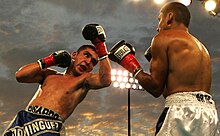 |
Ricardo Dominguez (left) throws an uppercut
|
- At the same time, the lead foot pivots clockwise, turning the left
heel outwards. Upon contact, the hook's circular path ends abruptly and
the lead hand is pulled quickly back into the guard position. A hook may
also target the lower body and this technique is sometimes called the
"rip" to distinguish it from the conventional hook to the head. The hook
may also be thrown with the rear hand. Notable left hookers include Joe Frazier , Roy Jones Jr. and Mike Tyson.
- Uppercut
– A vertical, rising punch thrown with the rear hand. From the guard
position, the torso shifts slightly to the right, the rear hand drops
below the level of the opponent's chest and the knees are bent slightly.
From this position, the rear hand is thrust upwards in a rising arc
towards the opponent's chin or torso.
- At the same time, the knees push upwards quickly and the torso and
hips rotate anti-clockwise and the rear heel turns outward, mimicking
the body movement of the cross. The strategic utility of the uppercut
depends on its ability to "lift" the opponent's body, setting it
off-balance for successive attacks. The right uppercut followed by a
left hook is a deadly combination employing the uppercut to lift the
opponent's chin into a vulnerable position, then the hook to knock the
opponent out.
These different punch types can be thrown in rapid succession to form
combinations or "combos." The most common is the jab and cross
combination, nicknamed the "one-two combo." This is usually an effective
combination, because the jab blocks the opponent's view of the cross,
making it easier to land cleanly and forcefully.
A large, swinging circular punch starting from a cocked-back position
with the arm at a longer extension than the hook and all of the
fighter's weight behind it is sometimes referred to as a "roundhouse,"
"haymaker," or sucker-punch. Relying on body weight and centripetal
force within a wide arc, the roundhouse can be a powerful blow, but it
is often a wild and uncontrolled punch that leaves the fighter
delivering it off balance and with an open guard.
Wide, looping punches have the further disadvantage of taking more
time to deliver, giving the opponent ample warning to react and counter.
For this reason, the haymaker or roundhouse is not a conventional
punch, and is regarded by trainers as a mark of poor technique or
desperation. Sometimes it has been used, because of its immense
potential power, to finish off an already staggering opponent who seems
unable or unlikely to take advantage of the poor position it leaves the
puncher in.
Another unconventional punch is the rarely used bolo punch,
in which the opponent swings an arm out several times in a wide arc,
usually as a distraction, before delivering with either that or the
other arm.
An illegal punch to the back of the head or neck is known as a rabbit punch.
Defense
There are several basic maneuvers a boxer can use in order to evade or block punches, depicted and discussed below.
-
-
-
-
Cover-Up (with the gloves)
-
-
-
- Slip – Slipping
rotates the body slightly so that an incoming punch passes harmlessly
next to the head. As the opponent's punch arrives, the boxer sharply
rotates the hips and shoulders. This turns the chin sideways and allows
the punch to "slip" past. Muhammad Ali was famous for extremely fast and close slips, as was an early Mike Tyson.
- A slipper will also most likely be a good counter puncher.
Most of the time a slipper will immediately strike their opponent back.
- Sway or fade – To anticipate a punch and move the upper body
or head back so that it misses or has its force appreciably lessened.
Also called "rolling with the punch" or " Riding The Punch".
- Duck or break – To drop down with the back straight so that a punch aimed at the head glances or misses entirely.
- Bob and weave – Bobbing
moves the head laterally and beneath an incoming punch. As the
opponent's punch arrives, the boxer bends the legs quickly and
simultaneously shifts the body either slightly right or left. Once the
punch has been evaded, the boxer "weaves" back to an upright position,
emerging on either the outside or inside of the opponent's
still-extended arm. To move outside the opponent's extended arm is
called "bobbing to the outside". To move inside the opponent's extended
arm is called "bobbing to the inside". Joe Frazier, Jack Dempsey, Mike
Tyson and Rocky Marciano were masters of bobbing and weaving.
- Parry/block – Parrying or blocking
uses the boxer's shoulder, hands or arms as defensive tools to protect
against incoming attacks. A block generally receives a punch while a
parry tends to deflect it. A "palm", "catch", or "cuff" is a defense
which intentionally takes the incoming punch on the palm portion of the
defender's glove.
- The cover-Up – Covering up is the last opportunity (other
than rolling with a punch) to avoid an incoming strike to an unprotected
face or body. Generally speaking, the hands are held high to protect
the head and chin and the forearms are tucked against the torso to
impede body shots. When protecting the body, the boxer rotates the hips
and lets incoming punches "roll" off the guard. To protect the head, the
boxer presses both fists against the front of the face with the
forearms parallel and facing outwards. This type of guard is weak
against attacks from below.
- The clinch – Clinching is a form of trapping or a rough form of grappling
and occurs when the distance between both fighters has closed and
straight punches cannot be employed. In this situation, the boxer
attempts to hold or "tie up" the opponent's hands so he is unable to throw hooks or uppercuts.
To perform a clinch, the boxer loops both hands around the outside of
the opponent's shoulders, scooping back under the forearms to grasp the
opponent's arms tightly against his own body. In this position, the
opponent's arms are pinned and cannot be used to attack. Clinching
is a temporary match state and is quickly dissipated by the referee.
Clinching is technically against the rules, and in amateur fights points
are deducted fairly quickly for it. It is unlikely, however, to see
points deducted for a clinch in professional boxing.
Philly Shell or Shoulder roll defense -This is actually a variation
of the cross-arm defense. The lead arm (left for an orthodox fighter and
right for a southpaw) is placed across the torso usually somewhere in
between the belly button and chest and the lead hand rests on the
opposite side of the fighter's torso. The back hand is placed on the
side of the face (right side for orthodox fighters and left side for
southpaws). The lead shoulder is brought in tight against the side of
the face (left side for orthodox fighters and right side for southpaws).
This style is used by fighters who like to counterpunch.
To execute this guard a fighter must be very athletic and
experienced. This style is so effective for counter punching because it
allows fighters to slip punches by rotating and dipping their upper body
and causing blows to glance off the fighter. After the punch glances
off, the fighter's back hand is in perfect position to hit their
out-of-position opponent. The shoulder lean is used in this stance. To
execute the shoulder lean a fighter rotates and ducks (to the right for
orthodox fighters and to the left for southpaws) when their opponents
punch is coming towards them and then rotates back towards their
opponent while their opponent is bringing their hand back.
The fighter will throw a punch with their back hand as they are
rotating towards their undefended opponent. The weakness to this style
is that when a fighter is stationary and not rotating they are open to
be hit so a fighter must be athletic and well conditioned to effectively
execute this style. To beat this style, fighters like to jab their
opponents shoulder causing the shoulder and arm to be in pain and to
demobilize that arm. Fighters that used this defense include Sugar Ray
Robinson, Ken Norton (also used this defense), Pernell Whitaker, James
Toney, and Floyd Mayweather Jr.
Less common strategies
- The "rope-a-dope" strategy : Used by Muhammad Ali in his 1974 "the Rumble in the Jungle"
bout against George Foreman, the rope-a-dope method involves lying back
against the ropes, covering up defensively as much as possible and
allowing the opponent to attempt numerous punches. The back-leaning
posture, which does not cause the defending boxer to become as
unbalanced as they would during normal backward movement, also maximizes
the distance of the defender's head from his opponent, increasing the
probability that punches will miss their intended target. Weathering the
blows that do land, the defender lures the opponent into expending
energy while conserving his/her own. If successful, the attacking
opponent will eventually tire, creating defensive flaws which the boxer
can exploit. In modern boxing, the rope-a-dope is generally discouraged
since most opponents are not fooled by it and few boxers possess the
physical toughness to withstand a prolonged, unanswered assault.
Recently, however, eight-division world champion Manny Pacquiao skillfully used the strategy to gauge the power of welterweight titlist Miguel Cotto in November 2009. Pacquiao followed up the rope-a-dope gambit with a withering knockdown.
- Bolo punch : Occasionally seen in Olympic boxing, the bolo is an arm punch which owes its power to the shortening of a circular arc
rather than to transference of body weight; it tends to have more of an
effect due to the surprise of the odd angle it lands at rather than the
actual power of the punch. This is more of a gimmick than a technical
maneuver; this punch is not taught, being on the same plane in boxing
technicality as is the Ali shuffle. Nevertheless, a few professional boxers have used the bolo-punch to great effect, including former welterweight champions Sugar Ray Leonard, and Kid Gavilan. Middleweight champion Ceferino Garcia is regarded as the inventor of the bolo punch.
- Overhand right :
The overhand right is a punch not found in every boxer's arsenal.
Unlike the right cross, which has a trajectory parallel to the ground,
the overhand right has a looping circular arc as it is thrown over the
shoulder with the palm facing away from the boxer. It is especially
popular with smaller stature boxers trying to reach taller opponents.
Boxers who have used this punch consistently and effectively include
former heavyweight champions Rocky Marciano and Tim Witherspoon, as well as MMA champions Chuck Liddell and Fedor Emelianenko. The overhand right has become a popular weapon in other tournaments that involve fist striking.
- Check hook :
A check hook is employed to prevent aggressive boxers from lunging in.
There are two parts to the check hook. The first part consists of a
regular hook. The second, trickier part involves the footwork. As the
opponent lunges in, the boxer should throw the hook and pivot on his
left foot and swing his right foot 180 degrees around. If executed
correctly, the aggressive boxer will lunge in and sail harmlessly past
his opponent like a bull missing a matador. This is rarely seen in
professional boxing as it requires a great disparity in skill level to
execute. Technically speaking it has been said that there is no such
thing as a check hook and that it is simply a hook applied to an
opponent that has lurched forward and past his opponent who simply hooks
him on the way past. Others have argued that the check hook exists but
is an illegal punch due to it being a pivot punch which is illegal in
the sport.
Floyd Mayweather, Jr. employed the use of a check hook against Ricky Hatton,
which sent Hatton flying head first into the corner post and being
knocked down. Hatton managed to get himself to his feet after the
knockdown but was clearly dazed and it was only a matter of moments
before Mayweather landed a flurry of punches which sent Hatton crashing
to the canvas, giving Mayweather a TKO victory in the 10th round and
handing Hatton his first defeat.
Ring corner
In boxing, each fighter is given a corner of the ring where he rests
in between rounds for 1 minute and where his trainers stand. Typically,
three men stand in the corner besides the boxer himself; these are the
trainer, the assistant trainer and the cutman.
The trainer and assistant typically give advice to the boxer on what he
is doing wrong as well as encouraging him if he is losing. The cutman
is a cutaneous doctor
responsible for keeping the boxer's face and eyes free of cuts and
blood. This is of particular importance because many fights are stopped
because of cuts that threaten the boxer's eyes.

In addition, the corner is responsible for stopping the fight if they
feel their fighter is in grave danger of permanent injury. The corner
will occasionally throw in a white towel to signify a boxer's surrender
(the idiomatic phrase "to throw in the towel", meaning to give up,
derives from this practice). This can be seen in the fight between Diego Corrales and Floyd Mayweather. In that fight, Corrales' corner surrendered despite Corrales' steadfast refusal.
Medical concerns
See also: Dementia pugilistica and The distance (boxing) § Distance change criticisms
Knocking a person unconscious or even causing concussion may cause permanent brain damage.
There is no clear division between the force required to knock a person out and the force likely to kill a person. Since 1980, more than 200 amateur boxers, professional boxers and Toughman fighters have died due to ring or training injuries. In 1983, the
Journal of the American Medical Association
called for a ban on boxing. The editor, Dr. George Lundberg, called
boxing an "obscenity" that "should not be sanctioned by any civilized
society." Since then, the British, Canadian and Australian Medical Associations also have called for bans on boxing.
Supporters of the ban state that boxing is the only sport where
hurting the other athlete is the goal. Dr. Bill O'Neill, boxing
spokesman for the British Medical Association,
has supported the BMA's proposed ban on boxing: "It is the only sport
where the intention is to inflict serious injury on your opponent, and
we feel that we must have a total ban on boxing."
Opponents respond that such a position is misguided opinion, stating
that amateur boxing is scored solely according to total connecting blows
with no award for "injury". They observe that many skilled professional
boxers have had rewarding careers without inflicting injury on
opponents by accumulating scoring blows and avoiding punches winning
rounds scored 10-9 by the 10-point must system, and they note that there are many other sports where concussions are much more prevalent.
In 2007, one study of amateur boxers showed that protective headgear did not prevent brain damage, and another found that amateur boxers faced a high risk of brain damage.
The Gothenburg study analyzed temporary levels of neurofiliment light
in cerebral spinal fluid which they conclude is evidence of damage, even
though the levels soon subside. More comprehensive studies of
neurologiocal function on larger samples performed by Johns Hopkins
University and accident rates analyzed by National Safety Council show
amateur boxing is a comparatively safe sport.
In 1997, the American Association of Professional Ringside Physicians
was established to create medical protocols through research and
education to prevent injuries in boxing.
Professional boxing is forbidden in Iceland, Iran and North Korea. It was banned in Sweden until 2007 when the ban was lifted but strict restrictions, including four three-minute rounds for fights, were imposed.
It was banned in Albania from 1965 till the fall of Communism in 1991;
it is now legal there. Norway legalized professional boxing in December
2014.
Boxing Hall of Fame
The sport of boxing has two internationally recognized boxing halls of fame; the International Boxing Hall of Fame (IBHOF) and the World Boxing Hall of Fame (WBHF), with the IBHOF being the more widely recognized boxing hall of fame.
The WBHF was founded by Everett L. Sanders in 1980. Since its
inception the WBHOF has never had a permanent location or museum, which
has allowed the more recent IBHOF to garner more publicity and prestige.
Among the notable names in the WBHF are Ricardo "Finito" Lopez, Gabriel "Flash" Elorde, Michael Carbajal, Khaosai Galaxy, Henry Armstrong, Jack Johnson, Roberto Durán, George Foreman, Ceferino Garcia and Salvador Sanchez. Boxing's International Hall of Fame was inspired by a tribute an American town held for two local heroes in 1982. The town, Canastota, New York, (which is about 15 miles (24 km) east of Syracuse, via the New York State Thruway), honored former world welterweight/middleweight champion Carmen Basilio and his nephew, former world welterweight champion Billy Backus.
The people of Canastota raised money for the tribute which inspired the
idea of creating an official, annual hall of fame for notable boxers.
The International Boxing Hall of Fame opened in Canastota in 1989. The first inductees in 1990 included Jack Johnson, Benny Leonard, Jack Dempsey, Henry Armstrong, Sugar Ray Robinson, Archie Moore, and Muhammad Ali. Other world-class figures include Salvador Sanchez, Jose Napoles, Roberto "Manos de Piedra" Durán, Ricardo Lopez, Gabriel "Flash" Elorde, Vicente Saldivar, Ismael Laguna, Eusebio Pedroza, Carlos Monzón, Azumah Nelson, Rocky Marciano, Pipino Cuevas and Ken Buchanan. The Hall of Fame's induction ceremony is held every June as part of a four-day event.
The fans who come to Canastota for the Induction Weekend are treated
to a number of events, including scheduled autograph sessions, boxing
exhibitions, a parade featuring past and present inductees, and the
induction ceremony itself.
GOVERNING AND SANCTIONING BODIES
- Governing Bodies
- British Boxing Board of Control (BBBofC)
- European Boxing Union
- Nevada State Athletic Commission
- Major Sanctioning Bodies
- International Boxing Federation (IBF)
- World Boxing Association (WBA)
- World Boxing Council (WBC)
- World Boxing Organization (WBO)
- Amateur
- International Boxing Association (AIBA; now also professional)
Boxer rankings
There are various organizations and websites, that rank boxers in both weight class and pound-for-pound manner.
- BoxRec (ratings)
- The Ring (ratings)
- ESPN (ratings)
- Transnational Boxing Rankings Board (Rating)
HABEEB AKINFEGBE
08060532466
morakinmoyo1@gmail.com























